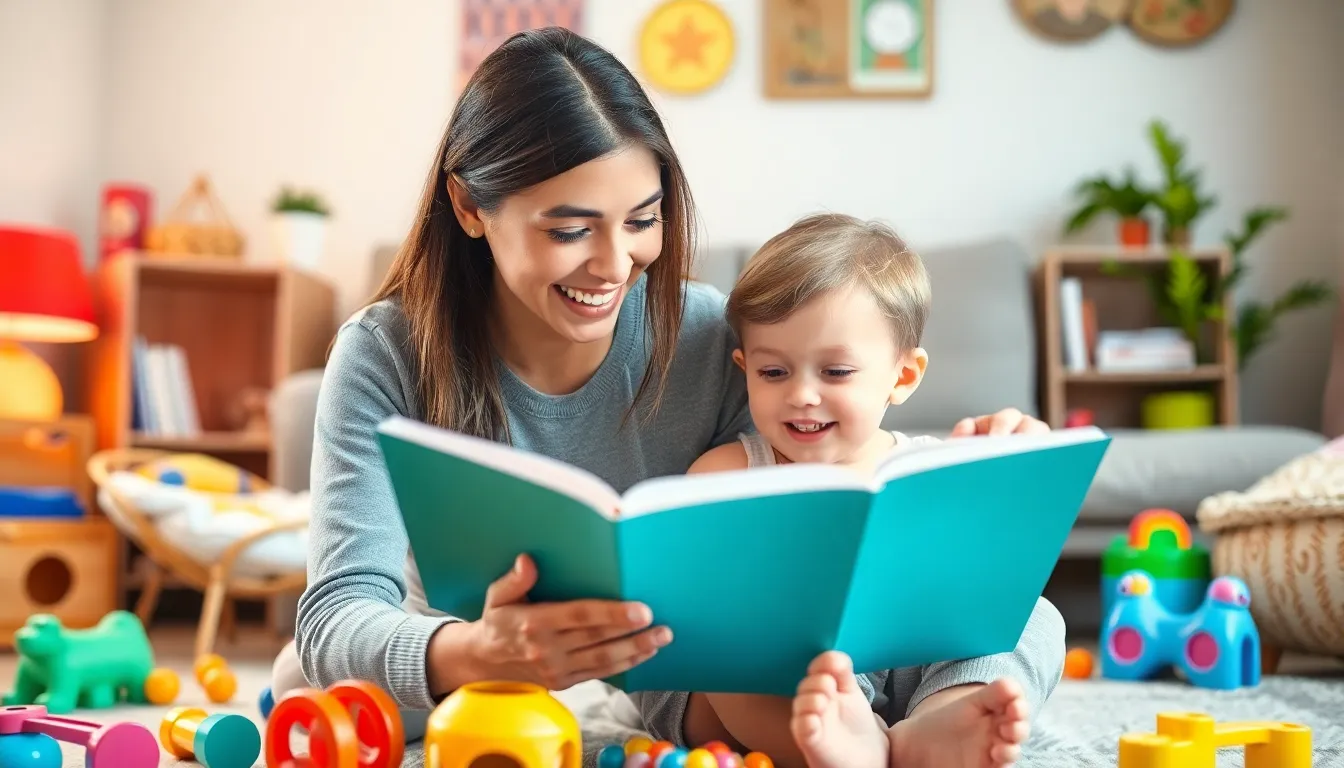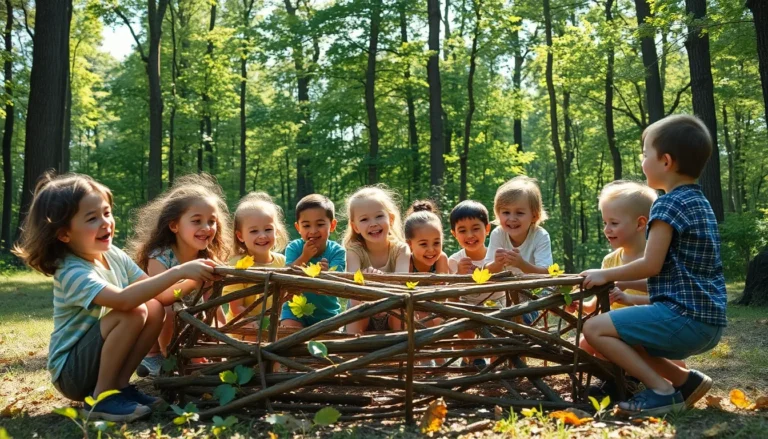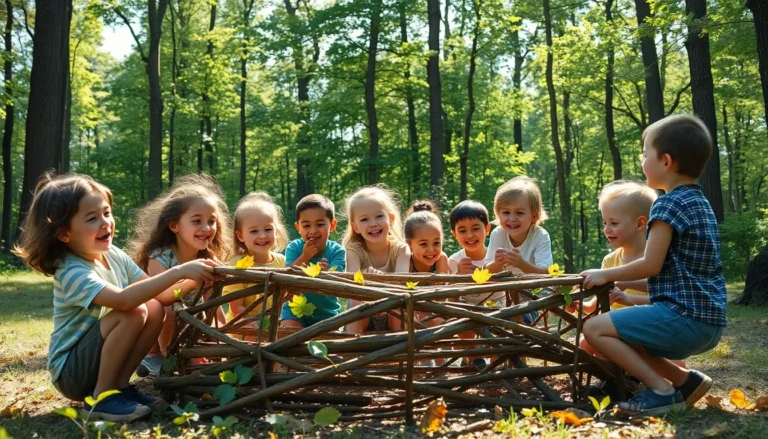Table of Contents
ToggleChild development theory isn’t just a fancy term thrown around in parenting circles; it’s the secret sauce behind raising well-rounded kids. Ever wondered why toddlers throw temper tantrums or why teenagers suddenly think they’re the next Picasso? Understanding these theories can help parents navigate the wild rollercoaster of childhood with a little more grace and a lot less hair-pulling.
Overview Of Child Development Theory
Child development theory encompasses various frameworks that explain how children grow and change physically, emotionally, socially, and cognitively over time. Major theorists like Jean Piaget, Erik Erikson, and Lev Vygotsky have significantly influenced these frameworks, each providing unique perspectives on the stages of development.
Piaget’s theory focuses on cognitive development, outlining stages such as sensorimotor, preoperational, concrete operational, and formal operational. Each stage reflects a child’s growing ability to think, reason, and understand the world, offering parents a roadmap for academic readiness.
Erikson’s psychosocial theory emphasizes emotional and social development. It consists of eight stages that each represent a conflict a child must navigate, such as trust versus mistrust in infancy. Recognizing these stages helps parents support their child’s emotional growth and identity formation.
Vygotsky introduced the social development theory, highlighting the significance of social interaction in learning. He explained that children learn through social contexts, which aids in cognitive development. This theory encourages collaborative learning among peers, beneficial for problem-solving skills.
Understanding these theories aids parents and educators in tailoring their approaches to meet a child’s needs. Implementing insights from various theories provides a well-rounded perspective on child development, promoting positive outcomes. Notably, each theory contributes valuable knowledge for navigating challenges along the parenting journey.
Major Theorists In Child Development

Various theorists contributed significantly to understanding child development, each presenting unique perspectives that enhance parenting and education strategies.
Sigmund Freud
Freud’s psychosexual development theory identifies five stages: oral, anal, phallic, latency, and genital. Each stage centers on how children navigate their impulses and societal expectations. Fixations during these stages often lead to specific personality traits. For example, an unresolved conflict at the anal stage may result in traits like orderliness or messiness in adulthood. Freud’s insights pave the way for understanding emotional challenges in children.
Erik Erikson
Erikson’s psychosocial theory consists of eight stages, spanning from infancy to adulthood. Each stage presents a conflict, such as trust versus mistrust during infancy. Successful resolution fosters a healthy personality and social relationships. Parents can support their children through stages by nurturing their independence and encouraging problem-solving. For instance, fostering initiative in preschoolers boosts confidence and resilience in later stages, promoting overall emotional health.
Jean Piaget
Cognitive development as outlined by Piaget occurs in four stages: sensorimotor, preoperational, concrete operational, and formal operational. These stages describe how children acquire, process, and understand information. Experiences during the sensorimotor stage shape foundational skills, while the formal operational stage allows for abstract thinking. Parents can guide children through these phases by providing age-appropriate challenges and stimulating environments. Understanding these stages ensures children develop academic and social competencies.
Lev Vygotsky
Vygotsky’s social development theory emphasizes the essential role of social interaction in learning. The concept of the Zone of Proximal Development outlines the difference between what a child can achieve independently and with guidance. Tools, like collaborative learning and scaffolding, enhance children’s skills and knowledge. Engagement with peers and adults accelerates cognitive development. Future educators can create enriching group activities, ensuring children thrive in their learning environments.
Key Concepts In Child Development Theory
Child development theory encompasses various components that significantly influence children’s growth. Notable concepts include developmental stages, the interplay of nature and nurture, and the importance of play.
Stages Of Development
Child development theory outlines distinct stages crucial for understanding growth. Piaget identified four cognitive stages: sensorimotor, preoperational, concrete operational, and formal operational. Each stage signifies essential skills children acquire, such as object permanence in infancy or logical reasoning in adolescence. Erikson’s eight psychosocial stages emphasize emotional and social challenges throughout life. For instance, the conflict of trust versus mistrust shapes early relationships, while the identity versus role confusion stage helps teenagers explore their sense of self. Understanding these stages enables parents to support their children’s needs at each developmental phase.
Nature Vs. Nurture
The nature versus nurture debate plays a vital role in child development theories. Nature refers to genetic predispositions that influence behavior and personality traits. For example, inherent intelligence levels or temperaments can affect how a child learns and interacts. Meanwhile, nurture encompasses environmental factors, such as parenting styles, educational opportunities, and cultural influences. Research consistently shows that both elements significantly impact development. A child’s unlocking potential becomes more accessible through supportive environments that encourage exploration and growth. Striking a balance between genetic and environmental influences allows for a comprehensive understanding of developmental outcomes.
The Role Of Play
Play is an essential component of child development theory, serving as a crucial learning tool. Engaging in play allows children to explore their environments, develop social skills, and enhance language abilities. Various types of play, including imaginative, cooperative, and solitary forms, contribute to cognitive and emotional growth. For instance, cooperative play fosters teamwork and communication, while imaginative play encourages creativity and problem-solving. Additionally, structured play activities promote fine motor skills and academic readiness. It becomes clear that play provides a foundation for lifelong learning, creating pathways for children to acquire essential life skills and navigate social interactions.
Modern Applications Of Child Development Theory
Child development theory finds extensive application in both educational strategies and parenting approaches. By leveraging these concepts, parents and educators foster healthier development in children.
Education Strategies
Early childhood education heavily incorporates Piaget’s cognitive stages, ensuring activities are age-appropriate. Teachers facilitate hands-on learning experiences that target children’s cognitive abilities. Vygotsky’s emphasis on social interaction encourages collaborative projects, strengthening peer relationships and communication skills. Incorporating Erikson’s psychosocial stages allows educators to address students’ emotional needs, creating an inclusive classroom. Designing curricula that incorporates play-based learning also enhances cognitive, social, and emotional growth, aligning with the natural learning tendencies of children. Integrating these strategies equips educators to support diverse learners effectively.
Parenting Approaches
Parenting approaches rooted in child development theory help raise emotionally healthy children. Understanding Erikson’s stages allows parents to provide appropriate guidance during key developmental transitions, ensuring children feel supported. Piaget’s framework encourages parents to adjust learning activities to suit their child’s cognitive capacity, fostering curiosity and interest in learning. Emphasizing Vygotsky’s principles promotes structured opportunities for collaborative play with peers. Tailoring communication strategies to align with children’s developmental stages fosters stronger parent-child relationships and offers a foundation for healthy emotional expression. These approaches enhance parenting experiences and nurture well-rounded individuals.
Child development theory is a powerful tool for parents and educators alike. By grasping the insights offered by key theorists, they can navigate the complexities of raising children more effectively. Understanding cognitive and emotional stages provides a framework for addressing challenges and fostering growth.
Incorporating these theories into everyday interactions not only supports children’s development but also enhances the overall parenting experience. As parents embrace these principles, they pave the way for healthier emotional and social outcomes, ensuring that children thrive in a nurturing environment. Ultimately, child development theory serves as a guide for creating a supportive atmosphere that encourages curiosity and lifelong learning.




